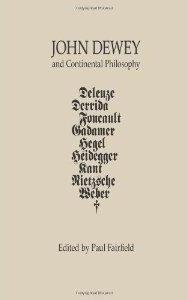
John Dewey and Continental Philosophy
Edited by Paul Fairfield
Contents
|
|
John Dewey and Continental Philosophy Edited by Paul Fairfield Contents Paul Fairfield, "Introduction: Overdue Conversations"
1. James Scott Johnston, "German Post-Kantian Idealism and Dewey's Metaphysics: Mutual Themes"
2. Tom Rockmore, "Dewey, Hegel, and Knowledge after Kant"
3. James A. Good and Jim Garrison, "Traces of Hegelian Bildung in Dewey's Philosophy"
4. Barry Allen, "Pragmatism and Gay Science: Comparing Dewey and Nietzsche"
5. Paul Fairfield, "Dewey, Nietzsche, and the Self-Image of Philosophy"
6. Joseph Margolis, "Heidegger: A Pragmatist by Any Means"
7. Sandra B. Rosenthal, "Science, Nature, and Philosophic Foundations: Dewey and Heidegger"
8. Richard J. Bernstein, "Pragmatism and Hermeneutics"
9. David Vessey, "Dewey, Gadamer, and the Status of Poetry among the Arts"
10. C. G. Prado, "Educating the Self: Dewey and Foucault"
11. Colin Koopman, "The History and Critique of Modernity: Dewey with Foucault against Weber"
12. Antonio Calcagno, "Meanings, Communication, and Politics: Dewey and Derrida"
13. Inna Semetsky, "Eagerness for Experience: Dewey and Deleuze on the Problematic of Thinking and Learning" |
Publisher's Description
John Dewey and Continental Philosophy provides a rich sampling of exchanges that could have taken place long ago between the traditions of American pragmatism and continental philosophy had the lines of communication been more open between Dewey and his European contemporaries. Since they were not, Paul Fairfield and thirteen of his colleagues seek to remedy the situation by bringing the philosophy of Dewey into conversation with several currents in continental philosophical thought, from post-Kantian idealism and the work of Friedrich Nietzsche to twentieth-century phenomenology, hermeneutics, and poststructuralism.
This unique volume includes discussions comparing and contrasting Dewey with German philosophers G.W.F. Hegel, Friedrich Nietzsche, Martin Heidegger, and Hans-Georg Gadamer on such topics as phenomenology, naturalism, organicism, contextualism, and poetry. Others investigate a series of connections between Dewey and contemporary French philosophy, including the notions of subjectivity, education, and the critique of modernity in Michel Foucault; language and politics in Jacques Derrida; and the concept of experience in Gilles Deleuze. Also discussed is the question of whether we can identify traces of Bildung in Dewey's writings on education, and pragmatism's complex relation to twentieth-century phenomenology and hermeneutics, including the problematic question of whether Heidegger was a pragmatist in any meaningful sense. Presented in intriguing pairings, these thirteen essays offer different approaches to the material that will leave readers with much to deliberate.
John Dewey and Continental Philosophy demonstrates some of the many connections and opportunities for cross-traditional thinking that have long existed between Dewey and continental thought, but have been under-explored. The intersection presented here between Dewey's pragmatism and the European traditions makes a significant contribution to continental and American philosophy and will spur new and important developments in the American philosophical debate.
"The essays in this volume are so uniformly good that they rival each other in value to the contemporary student of both American pragmatism and continental philosophy from Kant and Hegel to Derrida and Deleuze. Such boundary-crossing work is where contemporary philosophy is going, and this book is at the head of this movement."
--- Jay Martin, author of The Education of John Dewey
"These essays build a valuable, if virtual, bridge between the thought of John Dewey and that of a host of modern European philosophers. They invite us to entertain a set of imagined conversations among the mighty dead that no doubt would have intrigued Dewey and each of the interlocutors gathered here."
--- Robert B. Westbrook, author of John Dewey and American Democracy
"Taking the measure of similarities as well as differences, Fairfield's stellar group of contributors opens up new avenues of communication between these two important philosophical traditions."
--- Larry Hickman, Center for Dewey Studies, Southern Illinois University Carbondale